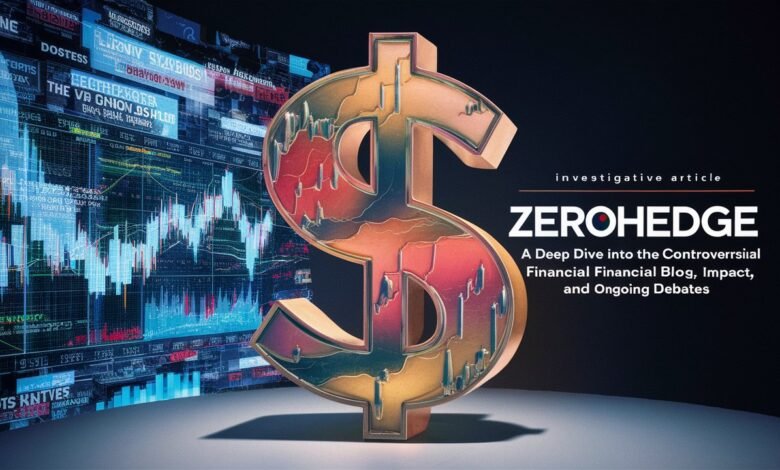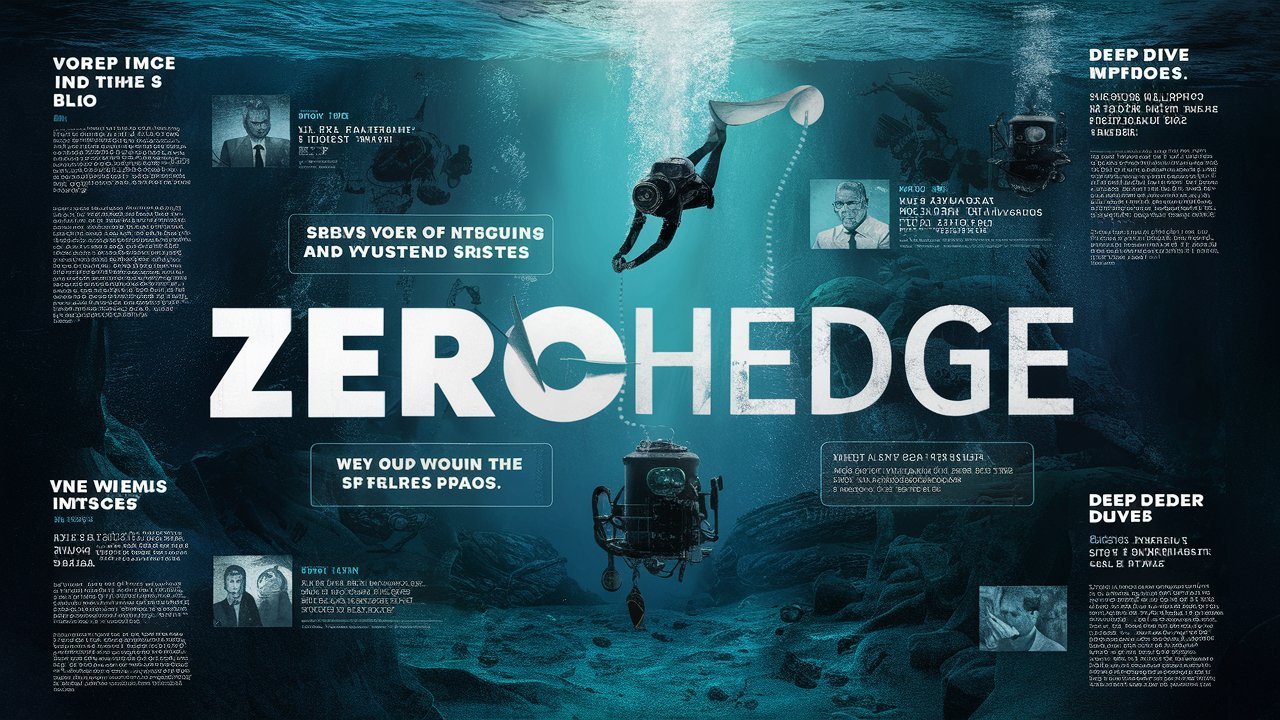ZeroHedge: A Deep Dive into the Controversial Financial Blog’s Rise Impact and Ongoing Debates

Introduction
ZeroHedge, a financial blog founded in 2009, has carved a unique niche in the world of financial journalism and alternative commentary. Known for its anonymous authorship, bearish market analysis, and often provocative takes on geopolitics and economics, the platform has amassed a dedicated following while simultaneously attracting criticism for its unorthodox methods and controversial narratives. This article explores ZeroHedge’s origins, its editorial style, its influence on financial markets, and the debates surrounding its credibility. By unpacking its role in modern media, we aim to understand why this platform continues to polarize readers and experts alike.
1. The Origins and Founding Philosophy of ZeroHedge
ZeroHedge emerged during the aftermath of the 2008 global financial crisis, a period marked by widespread distrust in mainstream financial institutions and media. The blog was launched under the pseudonym “Tyler Durden,” a nod to the anarchic character from Fight Club, signaling its anti-establishment ethos. Its founders, later revealed to include former investment professionals like Daniel Ivandjiiski, sought to challenge conventional narratives by providing “alternative” perspectives on markets, central banking, and geopolitical events.
The platform’s name itself—”Zero Hedge”—reflects its foundational philosophy: hedging against systemic risks in a world where traditional financial safeguards are perceived as ineffective. Early content focused on exposing vulnerabilities in the global financial system, often through detailed technical analysis and leaks from anonymous insiders. This approach resonated with readers disillusioned by the optimism of mainstream outlets during a time of economic turmoil.
2. Content and Editorial Style: Sensationalism or Necessary Alarmism?
ZeroHedge’s content is characterized by its combative tone, data-heavy reports, and a penchant for doom-and-gloom predictions. Articles often blend financial analysis with political commentary, touching on themes like central bank manipulation, inflation risks, and societal collapse. The blog’s style leans heavily on hyperbole and urgency, with headlines such as “The Everything Bubble Is About to Burst” or “Central Banks Have Lost Control.”
Critics argue that this sensationalism prioritizes clicks over accuracy, often amplifying fringe theories or unverified claims. Supporters, however, defend the platform as a necessary counterweight to overly optimistic mainstream narratives. ZeroHedge also distinguishes itself through its crowdsourced model, allowing anonymous contributors to publish under the “Tyler Durden” umbrella. This decentralized structure fosters diverse viewpoints but complicates accountability for factual errors.
3. Controversies and Accusations of Misinformation
ZeroHedge has repeatedly faced backlash for publishing conspiratorial content. In 2020, Twitter temporarily suspended its account for COVID-19 misinformation, including claims linking the virus to bioweapons research. The platform has also been accused of promoting far-right ideologies, anti-vaccine rhetoric, and politically charged narratives that align with populist movements.
These controversies have led to accusations that ZeroHedge prioritizes ideological alignment over journalistic integrity. Critics, including fact-checking organizations, argue that its lack of editorial transparency and reliance on anonymous sources undermine its credibility. Defenders counter that the blog’s role is to question authoritative narratives, even at the risk of occasional missteps, in the spirit of free speech.
4. Influence on Financial Markets and Retail Investors
Despite its controversies, ZeroHedge has undeniably impacted financial markets. Its analyses are frequently cited by traders, and its scoops—such as early warnings about liquidity crunches or corporate malfeasance—have occasionally preceded mainstream coverage. During the 2021 GameStop short squeeze, ZeroHedge amplified retail investor sentiment, highlighting the growing influence of alternative media in shaping market dynamics.
The blog’s audience includes both seasoned professionals and amateur investors drawn to its contrarian insights. However, its bearish outlook has also been blamed for exacerbating market panic during volatile periods. For instance, its relentless focus on Federal Reserve policies and debt crises has shaped public discourse, even as some of its predictions fail to materialize.
5. The Future of ZeroHedge: Sustainability and Relevance
As social media platforms tighten content moderation policies, ZeroHedge faces challenges in maintaining its reach. Its presence on platforms like Twitter and Facebook has been restricted at times, pushing its audience toward alternative channels like Telegram and Gab. Meanwhile, the blog continues to evolve, expanding into video content and podcasting to adapt to changing media consumption habits.
The key question is whether ZeroHedge can balance its identity as a rebel voice with the need for greater accountability. As trust in media erodes further, the demand for alternative perspectives may sustain its relevance. However, its long-term survival likely depends on addressing criticisms of misinformation without diluting its provocative edge.

Conclusion
ZeroHedge remains a lightning rod in financial and political discourse, embodying the tensions between free speech and responsible journalism. Its rise from a niche blog to a influential—and controversial—media entity reflects broader societal shifts toward distrust in institutions and hunger for unfiltered information. While its detractors view it as a purveyor of chaos, its supporters celebrate it as a truth-teller in an age of censorship. As the digital media landscape evolves, ZeroHedge’s legacy will hinge on its ability to navigate the fine line between skepticism and sensationalism.
Frequently Asked Questions (FAQs)
Q1: Who owns ZeroHedge?
ZeroHedge was co-founded by Daniel Ivandjiiski, a Bulgaria-based former investment banker, though much of its content is contributed anonymously under the collective pseudonym “Tyler Durden.”
Q2: Why is ZeroHedge considered controversial?
The platform is criticized for publishing unverified claims, conspiracy theories, and politically biased content. Its confrontational style and lack of editorial transparency fuel debates about its reliability.
Q3: Has ZeroHedge ever influenced financial markets?
Yes. Its analyses have swayed retail investor sentiment, and its early warnings on issues like corporate debt bubbles have occasionally preceded mainstream media coverage.
Q4: Is ZeroHedge a reliable source for financial news?
While it offers unique insights, readers should cross-reference its claims with reputable sources due to its history of sensationalism and factual errors.
Q5: What challenges does ZeroHedge face in the future?
Content moderation policies on major platforms, competition from newer alternative media, and the need to balance free speech with accountability are key hurdles.
This article provides a comprehensive overview of ZeroHedge’s complex role in modern media, encouraging readers to critically engage with its content while acknowledging its impact on financial and cultural discourse.



